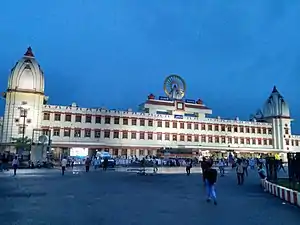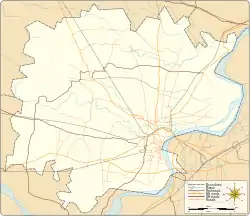Varanasi Junction railway station
Varanasi Junction railway station (station code: BSB), also known as Varanasi Cantt railway station, is the main railway station serving the city of Varanasi. The other key railway stations in Varanasi Metro area are Banaras (formerly Manduadih), Varanasi City, Mughalsarai and Kashi. The junction station is sandwiched between the cantonment region and Chetganj region of the city.[1] The station is partially controlled by the Lucknow Division of the Northern Railway Zone and the Varanasi Division of the North Eastern Railway Zone of the Indian Railways. Varanasi Junction railway station nearly reaches the frequency of 300 trains daily. Almost, 45 trains originate and terminate at the station. Premium trains of Indian Railways also originate from Varanasi Junction, such as Vande Bharat Express and IRCTC Kashi Mahakal Humsafar Express.
 Varanasi Junction | |
|---|---|
| Indian Railways station | |
 | |
| Location | Varanasi, Varanasi district, Uttar Pradesh India |
| Coordinates | 25°19′37″N 82°59′11″E |
| Elevation | 80.71 metres (264.8 ft) |
| Owned by | Indian Railways |
| Operated by | Indian Railways |
| Line(s) | Varanasi–Faizabad–Lucknow line Varanasi–Rae Bareli–Lucknow line Varanasi–Sultanpur–Lucknow line Varanasi–Banaras -Allahabad line Varanasi–Pt. Deen Dayal Upadhyaya line Varanasi–Mau–Gorakhpur line Varanasi–Ballia–Chhapra line Varanasi–Vyasnagar–Jeonathpur-Allahabad line |
| Platforms | 1-9 & 1A (and 2 under construction) |
| Tracks | 13 |
| Connections | Central bus station, Taxi stand, Auto stand |
| Construction | |
| Structure type | Standard (on-ground station) |
| Parking | Available |
| Disabled access | Yes |
| Other information | |
| Status | Functioning |
| Station code | BSB |
| Zone(s) | Northern Railway |
| Division(s) | Lucknow NR |
| History | |
| Opened | 1872 |
| Electrified | Yes |
| Previous names | Banaras Junction |
| Passengers | |
| 400,000/day | |
| Location | |
 Varanasi Junction railway station Location within Varanasi district | |
Railways around Varanasi | ||||||||||||||||||||||||||||||||||||||||||||||||||||||||||||||||||||||||||||||||||||||||||||||||||||||||||||||||||
|---|---|---|---|---|---|---|---|---|---|---|---|---|---|---|---|---|---|---|---|---|---|---|---|---|---|---|---|---|---|---|---|---|---|---|---|---|---|---|---|---|---|---|---|---|---|---|---|---|---|---|---|---|---|---|---|---|---|---|---|---|---|---|---|---|---|---|---|---|---|---|---|---|---|---|---|---|---|---|---|---|---|---|---|---|---|---|---|---|---|---|---|---|---|---|---|---|---|---|---|---|---|---|---|---|---|---|---|---|---|---|---|---|---|---|
| ||||||||||||||||||||||||||||||||||||||||||||||||||||||||||||||||||||||||||||||||||||||||||||||||||||||||||||||||||
| Source: Google maps | ||||||||||||||||||||||||||||||||||||||||||||||||||||||||||||||||||||||||||||||||||||||||||||||||||||||||||||||||||
History
The first line to the temple town was opened from Howrah in 1862. The Chief Engineer of East Indian Railway Company, George Turnbull directed and built the route via Patna. In 1872, a line was added for Lucknow and in 1887, Malviya Bridge was opened to connect the city with Mughalsarai. Also, the bridge connected the Oudh and the Rohilkhand Railway with those of the East India Company at Mughal Sarai.[2]
Infrastructure
The Varanasi Junction railway station has a modern Route Interlock System with an automated signaling system. Varanasi Junction railway station was ranked 14th among 75 busiest A1 category stations on the cleanliness scale.[3] At present, there are 9 platforms while 3 more platforms are being constructed to take off the load.[4] Well, the station is equipped with water ATMs, escalators, Wifi, lifts, and many other public conveniences. Due to heavy inflow of tourists from across the country, the railway administration has planned to add the public announcements in other languages such as Tamil, Malayalam, Kannada, Odia, Marathi, and Telugu.[5]
Modernization
In 2018, the station was included in the list of 90 stations to be converted into world-class hubs. The redevelopment plan will include the induction of CCTV cameras, Wifi, renovation of the station buildings, modular water kiosks, water, ATMs, LED lights, lifts, escalators, stainless steel benches, and modular catering kiosks.[6] Varanasi Junction railway station is also loaded with rooftop solar panels which can generate up to 600 KW and the administration is planning to add another 1000KW.[7]
See also
References
- "Google Maps".
- "Bridge over the Ganges".
- "Varanasi railway station ranks 14th on cleanliness scale".
- "Cantt Railway station to have 3 more platforms".
- "Varanasi station to have announcements in South Indian languages".
- "World-class! Indian Railways to transform 90 stations into airport-like transit hubs".
- "Solar power capacity boost at Varanasi Cantt station".
External links
| Wikimedia Commons has media related to Varanasi Junction railway station. |
 Varanasi travel guide from Wikivoyage
Varanasi travel guide from Wikivoyage